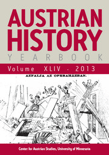
Austrian History Yearbook
Scope & Guideline
Enriching Historical Discourse on Austria and Beyond
Introduction
Aims and Scopes
- Central European History:
The journal consistently explores Austria's historical context within Central Europe, examining its political, social, and cultural dynamics over the centuries. - Interdisciplinary Approaches:
Research published in the journal often utilizes interdisciplinary methodologies, combining history with insights from sociology, political science, and cultural studies. - Migration and Identity:
A significant focus is placed on migration patterns and the evolution of identities, particularly in relation to the Habsburg Empire and its successor states. - Cultural Exchange and Influence:
The journal highlights the cultural exchanges that shaped Austrian identity, including artistic, musical, and intellectual movements throughout history. - Gender and Society:
There is a notable emphasis on gender studies, exploring the roles and representations of different genders throughout Austrian history. - Historical Memory and Politics:
The journal examines the politics of historical memory, particularly how past events are remembered or forgotten in contemporary discourse.
Trending and Emerging
- Postcolonial Perspectives:
Recent articles are increasingly examining Austria's historical narrative through postcolonial lenses, considering the implications of its imperial past and the legacies of colonialism. - Transnationalism:
There is a growing focus on transnational connections, exploring how Austria interacted with and influenced other nations, particularly in Central and Eastern Europe. - Memory Studies:
Research on how collective memory shapes national identity and historical narratives is gaining traction, reflecting contemporary concerns about history's role in modern politics. - Digital History:
The use of digital tools and methodologies in historical research is on the rise, with more scholars integrating digital humanities approaches into their work. - Social Movements and Activism:
There is an increasing interest in exploring social movements, including feminist and labor movements, and their impact on Austrian society through various historical periods.
Declining or Waning
- Environmental History:
Interest in environmental history appears to be waning, with fewer papers exploring the interactions between people and their environments compared to earlier volumes. - Economic History:
Although still relevant, there seems to be a decline in the number of articles focusing specifically on economic history and the economic structures of the Habsburg Empire. - Military History:
Military history, particularly detailed studies of battles and military strategies, has seen a decrease in representation, as the journal shifts towards more social and cultural histories. - Colonial Studies:
Discussions surrounding Austria's colonial past and its implications have become less frequent, indicating a possible shift away from this area of inquiry. - Local Histories:
While local histories have been a part of the journal's offerings, there seems to be a decline in focused studies on specific towns or regions within Austria.
Similar Journals

Studia Austriaca
Cultivating Knowledge in the Landscape of Austrian StudiesStudia Austriaca, published by Milano University Press, is a distinguished open-access journal that has been promoting scholarly discourse in the realms of Cultural Studies and Literature since its inception in 1992. Based in Italy, this journal aims to serve as a vital platform for researchers, professionals, and students seeking to explore the complexities of Austrian culture and its literary contributions. With ISSN 1593-2508 for print and E-ISSN 2385-2925 for online access, Studia Austriaca offers a comprehensive repository of articles that reflect a dynamic understanding of cultural interactions. Although its current Scopus rankings place it in the lower percentiles of the Arts and Humanities categories, the journal's commitment to maintaining high academic standards and facilitating open access ensures that it remains an essential reference for academic inquiry. The journal's coverage is set to continue evolving, with converged years extending from 2017 to 2024, thus paving the way for emerging discussions and research developments in the fields of literature and cultural studies.
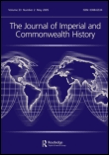
JOURNAL OF IMPERIAL AND COMMONWEALTH HISTORY
Exploring the legacies of power and governance.The JOURNAL OF IMPERIAL AND COMMONWEALTH HISTORY, published by Routledge Journals, Taylor & Francis Ltd, stands as a pivotal platform for scholarly discourse in the fields of imperial studies, history, and political science. This esteemed journal, with an ISSN of 0308-6534 and E-ISSN 1743-9329, has been contributing significantly to academic discussions since its inception in 1972 and continues to publish until 2024. With its categorical rankings placing it in Q1 in History, alongside emerging categories in Development and Political Science, it appeals to a wide array of researchers, professionals, and students interested in the complexities of historical and contemporary issues within imperial and commonwealth contexts. The journal's commitment to rigorous academic standards is reflected in its impressive Scopus rankings, which position it in the top percentiles of its respective fields. While currently not an open access journal, it remains a valuable resource for those looking to enhance their understanding of historical impacts and political relations in the imperial context, thereby solidifying its role as an essential tool for scholarly exploration and inquiry.

Hungarian Geographical Bulletin
Connecting researchers with cutting-edge insights in geography.Hungarian Geographical Bulletin, with ISSN 2064-5031 and E-ISSN 2064-5147, is a premier open-access journal published by the CSFK GEOGRAPHICAL INSTITUTE that has been an influential resource since 2009, dedicated to advancing the fields of geography, cultural studies, and agronomy. Located in Budapest, Hungary, this journal aims to disseminate high-quality research and engage a diverse audience of researchers, professionals, and students. The journal's reputation is underscored by its impressive category quartiles in 2023, ranking Q2 in Agronomy and Crop Science, Q1 in Cultural Studies, and Q2 across several other areas, including Geography and Earth and Planetary Sciences. With a Scopus ranking that places it in the top percentiles in multiple fields, the Hungarian Geographical Bulletin serves as an essential platform for innovative ideas and discussions that drive geographical scholarship and practice forward, specifically during its converged years from 2014 to 2024. Whether you are a seasoned researcher or an enthusiastic student, this journal presents a wealth of knowledge that is easily accessible due to its open-access format.
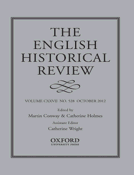
ENGLISH HISTORICAL REVIEW
Fostering Insight in Historical StudiesThe English Historical Review, published by Oxford University Press, stands as one of the foremost journals in the field of history, with a remarkable legacy that dates back to 1886. With an ISSN of 0013-8266 and an E-ISSN of 1477-4534, the journal serves as a vital platform for the dissemination of scholarly research and critical analysis among historians and researchers alike. It boasts an impressive positioning in the academic landscape, currently ranking in the Q2 category for History and occupying the 60th percentile in the Scopus ranks within the Arts and Humanities. Although it operates under a subscription model, the English Historical Review continues to attract contributions that shape our understanding of historical narratives and methodologies. Researchers, professionals, and students will find its rich content indispensable for both their studies and professional practice, making it a pivotal resource for advancing the discipline of history.
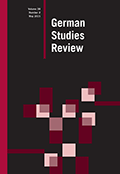
GERMAN STUDIES REVIEW
Engaging with the Rich Tapestry of German HeritageGERMAN STUDIES REVIEW, published by Johns Hopkins University Press, is a premier academic journal dedicated to the interdisciplinary study of German culture and society, merging literary, historical, and cultural studies. With a commitment to advancing scholarship since its inception in 1982, this journal serves as an essential platform for researchers, professionals, and students interested in Germanic studies, boasting an ISSN of 0149-7952 and an E-ISSN of 2164-8646. While it is presently classified in the Q4 quartile of both the Arts and Humanities (miscellaneous) and Cultural Studies categories by Scopus, its wide-ranging scope includes not just traditional literary analysis, but also contemporary cultural phenomena, making it relevant to various fields. Although the journal is not open access, its contributions are vital for fostering critical dialogue and scholarly research that explores the complexities of German culture in a global context. The GERMAN STUDIES REVIEW is an invaluable resource for anyone eager to deepen their understanding of German studies and engage with cutting-edge academic discussions.

Judaica Bohemiae
Exploring the Rich Tapestry of Jewish Heritage in Central EuropeJudaica Bohemiae, published by the Zidovske Muzeum Praze, is a prominent scholarly journal dedicated to the study of Jewish culture, history, and religious practices, with a particular focus on the Czech Republic and Central Europe. Since its relaunch in 2007, the journal has established itself as a valuable resource in the fields of Cultural Studies, History, and Religious Studies, achieving a commendable Q2 ranking across these disciplines in 2023. With its thoughtful compilation of research articles and critical essays, Judaica Bohemiae offers insights into the evolving dynamics of Jewish existence and identity. Although it does not currently operate under an open access model, the journal ensures that its high-quality content remains accessible to researchers, professionals, and students interested in the nuanced intersections of culture and history. By promoting rigorous academic discourse and advancing the understanding of Jewish heritage, Judaica Bohemiae continues to play a crucial role in its field, fostering scholarly connections and illuminating the past for future generations.
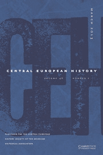
CENTRAL EUROPEAN HISTORY
Illuminating the Past, Shaping the Future of Central EuropeCENTRAL EUROPEAN HISTORY is a distinguished academic journal published by Cambridge University Press, dedicated to the exploration and analysis of historical developments in Central Europe. With its ISSN 0008-9389 and E-ISSN 1569-1616, this journal has been a cornerstone in historical scholarship since its inception in 1968, catering to a global audience through its rigorous research articles and interdisciplinary approach. Recognized in the Q2 category in History in 2023, it aims to bridge gaps in Central European historiography and foster a deeper understanding of the region's complex past. The journal's commitment to publishing high-quality research makes it an invaluable resource for historians, researchers, and students alike. Although it does not offer Open Access, CENTRAL EUROPEAN HISTORY remains a vital publication in the field, addressing themes and debates that resonate with contemporary academic discourses. With a rich archive spanning over five decades, it continues to influence scholarship and promote informed discussions around Central European historical narratives.

Journal of Austrian Studies
Celebrating the Richness of Austrian StudiesThe Journal of Austrian Studies, published by University of Nebraska Press, serves as a vital academic platform dedicated to the exploration of Austrian culture, literature, and theory, making significant contributions to the interdisciplinary fields of Cultural Studies and Literature. Established in 2012, this esteemed journal boasts an ISSN of 2165-669X and an E-ISSN of 2327-1809, reflecting its commitment to broad scholarly communication. Despite being positioned in Q4 for Cultural Studies and Q3 for Literature and Literary Theory as of 2023, its focus on innovative research and critical discourse allows it to remain relevant in the academic community. With Scopus rankings indicating its niche yet important place among related journals, the Journal of Austrian Studies aims to foster understanding of Austria's rich cultural heritage and its contemporary implications, appealing to researchers, professionals, and students alike who seek rigorous analysis and scholarly debate. This journal provides an inclusive forum for sharing ideas and developments, contributing to the evolving dialogue in Austrian studies.

Comparative Southeast European Studies
Innovating Research for a Deeper Understanding of Southeast EuropeComparative Southeast European Studies, published by WALTER DE GRUYTER GMBH, is an esteemed open-access journal that has been contributing to scholarly discourse since its inception in 2021. With its ISSN 2701-8199 and E-ISSN 2701-8202, the journal is dedicated to the multidisciplinary examination of Southeast European societies, cultures, and economies. The journal strives to foster a nuanced understanding of historical and contemporary issues through an array of perspectives, appealing to researchers, professionals, and students alike. While it currently resides in Q4 for several categories including Anthropology, Economics, and Political Science, it maintains a robust platform for innovative research and dialogue within the region. Situated in Germany, this journal serves not only as a repository of knowledge but also as a catalyst for future scholarly endeavors, with the aim to elevate the discourse surrounding Southeast Europe during the converging years of 2021 to 2024. Its commitment to open access ensures that critical research is readily available, inspiring collaboration and engagement across academic and professional communities.
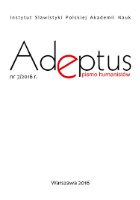
Adeptus
Fostering Innovative Scholarship in Slavic StudiesAdeptus is a pioneering open-access journal published by the Polish Academy of Sciences, Institute of Slavic Studies, specializing in Slavic studies and cultural research. Since its inception in 2014, the journal has aimed to foster scholarly dialogue and advance knowledge across various disciplines related to Slavic languages, literature, history, and sociology. With an ISSN of 2300-0783, Adeptus has positioned itself as a vital resource for researchers, professionals, and students engaged in Slavic studies, offering a platform for high-quality, peer-reviewed articles that explore diverse topics within the field. The journal's open-access model promotes accessibility and dissemination of knowledge, making it a significant contributor to the academic landscape. Located in Warsaw, Poland, Adeptus continues to thrive as a key outlet for innovative research, inviting submissions that embody rigorous scholarship and insightful perspectives.